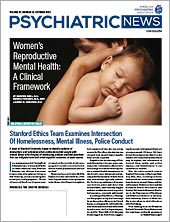Metacognitive training (MCT) for psychosis—which helps patients learn to question unfounded assumptions known as cognitive biases that contribute to their symptoms—was associated with reduced delusions and hallucinations and improved self-esteem and functioning, according to a report in JAMA Psychiatry. Common cognitive biases in people with psychosis include jumping to conclusions, inflexibility about one’s beliefs, and overconfidence in one’s judgments.
“[T]he benefits of MCT were maintained up to one year after the intervention,” said lead author Danielle Penney, a Ph.D. candidate at Douglas Research Center of McGill University, in a press release. “More generally, these findings support the utility of MCT as an effective tool that can be offered by mental health care workers across health care settings.”
The researchers analyzed 43 studies of MCT involving 1,816 participants. Of the 43 studies, 30 were randomized, controlled trials (RCTs), 11 were non-RCTs, and two were quantitative descriptive studies. The researchers examined the effect of MCT on global symptoms, delusions, hallucinations, and cognitive biases. They also looked at the effect of MCT on self-esteem, negative symptoms, quality of life, well-being, and functioning.
MCT was associated with a reduction of all symptoms examined, with effect sizes that ranged from small (0.16 for cognitive biases, 0.17 for self-esteem, 0.23 for negative symptoms, and 0.26 for hallucinations) to medium (0.41 for functioning and 0.50 for positive symptoms) and large (0.69 for delusions). Moreover, analysis of RCTs found that both treatment and control groups maintained the therapeutic level reached at the end of treatment for all outcomes at the one-year follow-up.
MCT for psychosis was developed by Steffen Moritz, Ph.D., head of the Clinical Neuropsychology Working Group at the University of Hamburg, and Todd Woodward, Ph.D., a professor of psychiatry at the University of British Columbia.
In an interview, Woodward said he and Moritz began developing tests to measure the thought patterns that underlie delusions, and it was out of this effort that MCT was created. Woodward explained that these thought patterns exist to some degree among all people, though they are more pronounced in people with psychosis.
For instance, people in general have a bias against “dis-confirmatory evidence”—against evidence that runs counter to their beliefs; they may also experience uncertainty when reading facial clues or social situations to understand how someone else may be thinking or feeling (known as “theory of mind”). And all people tend to be confident in how they remember something even when, objectively, their memories are inaccurate.
“These are patterns of thinking that are exacerbated in schizophrenia,” Woodward said. He and Moritz developed PowerPoint slides that introduced these common biases to individuals with psychosis through scenarios presented in a group format.
“We talk about how everyone has these biases in their thinking,” Woodward said. “The important thing is that those with psychosis are able to eventually link these common biases to their own delusions. They start to realize that since everyone has biases, they must too, and that doubt can be cast on many conclusions about the world, including delusions. So, someone might be able to say, ‘I’m not 100% sure my friend didn’t show up at my party because he has it in for me, and there may be other reasons.’ This bit of insight can be the foot in the door to developing healthier thought patterns.”
Metacognitive interventions include, in addition to MCT, metacognitive therapy, metacognitive insight, and reflection therapy. MCT for psychosis delivered in a group format is the most widely investigated among these interventions and combines psychoeducation, cognitive bias modification, and strategy teaching.
In the JAMA Psychiatry study, the effects of MCT on symptoms in people with psychosis were similar to the effects reported in studies of cognitive-behavioral therapy for psychosis and cognitive remediation. Previous analyses of cognitive-behavioral therapy for patients with psychosis found small to moderate effects on delusions and small effects on hallucinations, negative symptoms, and functioning. Similarly, prior meta-analyses of cognitive remediation have reported small to moderate effects for negative symptoms, global symptoms, and functioning.
The researchers concluded, “These findings provide some evidence to consider MCT in international treatment guidelines, and the focus may now shift toward implementation and cost-effectiveness trials in real-world clinical settings.” ■

